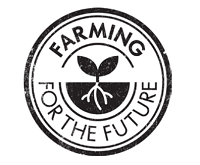 Concerned at the environmental impact of farming, Woolworths decided almost two decades ago to take the food chain into their own hands.
Concerned at the environmental impact of farming, Woolworths decided almost two decades ago to take the food chain into their own hands.
Their Farming For the Future programme today supports all of the fruit, vegetables and flowers plus the long life dairy and wine produced for Woolworths on 800 farms across the country. It is their answer to a food system that was requiring ever more inputs for dipping yields.
There is no set check-list – this is where the programme fundamentally differs from other audits (though it depends heavily on the data keeping required by Global GAP): the Farming For the Future team meets a farmer and all of his or her other advisers and, like a mechanic, conducts a diagnostic of the farm.
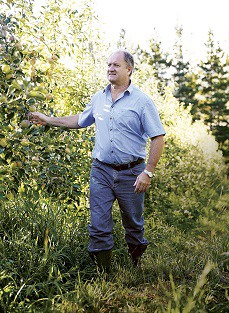 "It doesn't matter if a farmer is organic, or biodynamic, or a conventional farmer. We look at that farm on its own terms and how resilience can be built into that specific farm in its particular surroundings," explains Kobus Pienaar, the programme manager since its inception (right).
"It doesn't matter if a farmer is organic, or biodynamic, or a conventional farmer. We look at that farm on its own terms and how resilience can be built into that specific farm in its particular surroundings," explains Kobus Pienaar, the programme manager since its inception (right).
"We knew from the start we needed to go beyond compliance."
At the heart of the Farming For the Future programme is the intention of lowering a farm's footprint through regenerative farming principles on both the environment and on the people who produce the food.
Farming outcomes, not the consumer, pay for the programme
"We benefit because it improves availability of high class product – but 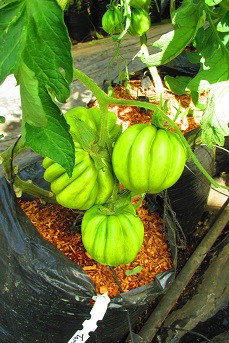 early on we decided we couldn't do it if the customer has to pay a premium, as is the case with organic. The things we do on the farm have to pay for the effort through increased yield and quality."
early on we decided we couldn't do it if the customer has to pay a premium, as is the case with organic. The things we do on the farm have to pay for the effort through increased yield and quality."
Right: heirloom tomatoes grown for Woolworths on Rennie Farm, Paarl
With some farmers they only see the results after twelve years, he remarks, with others change is visible after a year.
Their regular research partner is EnviroScientific, an advisory body, with inputs from the World Wildlife Fund since certain farms are in ecologically sensitive parts of the country.
Woolworths' initiative has attracted global attention and has been the subject of research by Stanford University and Coventry University, among others.
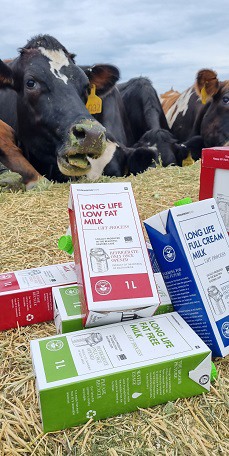 They kicked this initiative off with fresh produce because the sector represents their largest physical footprint in the country (although not, Kobus points out, the largest carbon or water footprint – that distinction belongs to dairy and meat production) and also because fresh produce procurement runs in a more direct line than other types of food and drink.
They kicked this initiative off with fresh produce because the sector represents their largest physical footprint in the country (although not, Kobus points out, the largest carbon or water footprint – that distinction belongs to dairy and meat production) and also because fresh produce procurement runs in a more direct line than other types of food and drink.
Right: Woolworths longlife milk produced according to Farming For the Future principles
Digging deeper than an audit
In a meeting with the farmer and his or her regular advisers, the goals for the farm within horizons of one year, two years and eventually five years are negotiated.
First they set about fixing what the farmer perceives as the biggest problem at that moment, which can be anything from yield to labour relations.
"When we've fixed that problem, we turn to what the other priorities are according to our team of scientists, say water usage per kg produced or nitrogen usage. We show the farmer the possibilities that exist to farm more sustainably and with more resilience."
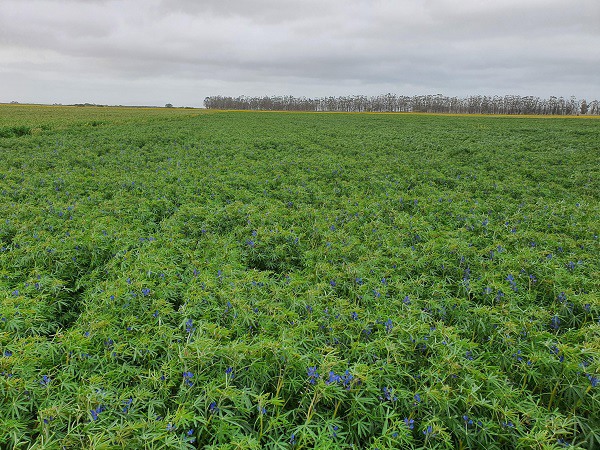 A lupine green crop to build up soil health in the Western Cape
A lupine green crop to build up soil health in the Western Cape
Global GAP is an excellent entry into sustainable farming and a very good vehicle for datakeeping, he says, and he likes SIZA's (the Sustainability Institute of South Africa) focus on ethics in the workplace, but these audits offer one paradigm for all farms.
"For example, Global GAP asks whether soil analyses are done. We dig deeper: we look at the lab results and we also look at the soil laboratory. We ask: how were the soil analyses interpreted? Who helps you with that? What were the recommendations and how were they implemented? What were the results?"
Building to a point where spraying is not necessary
On Farming For the Future farms crops are sprayed less often than on conventional farms but, he emphasises, the programme is neither organic nor anti-organic.
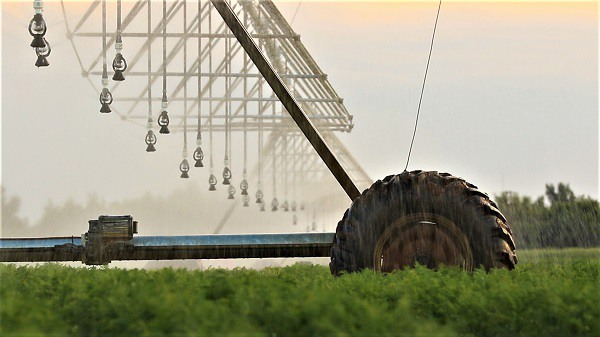 A carrot field being irrigated
A carrot field being irrigated
Kobus maintains that it is possible to stop spraying with synthetic pesticides altogether when irrigation and fertilization practices are just right and biological products are used as part of an integrated pest management system.
In fact, he mentions some Farming For the Future farmers are very close to achieving that.
"Farming For the Future growers have to move away from chemical concoctions and programmed spraying. Crop walks and weather forecasts are included in the decision of whether a spray is really necessary."
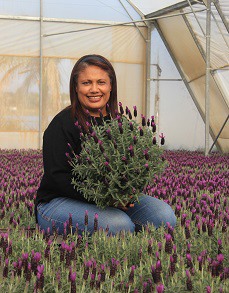 He uses the example of a patient at the doctor who must decide when it's time to administer antibiotics and when it'd be judicial to improve the diet and lifestyle. He states that as a rule, pests only attack plants under stress.
He uses the example of a patient at the doctor who must decide when it's time to administer antibiotics and when it'd be judicial to improve the diet and lifestyle. He states that as a rule, pests only attack plants under stress.
Right: Jacky Goliath, managing director of De Fynne flower nursery, a Farming For the Future flower supplier
"A farmer has to give us a pretty good explanation before spraying a hard chemical like a pyrethroid or an organophosphate on a pest. We first ask a lot of questions: which beneficial insects would predate on the pest and are they present on the farm? Do you know the cycle of the pest and its life stage to spray at the right stage? Ideally, the ecosystem's health can be built up to a point where sprayings with synthetic chemicals are not necessary."
Afterwards, depending on the nature of the applied chemical and its withholding period plus its environmental impact, the effect on the farm's insect populations has to be measured, for up to 15 weeks in some instances.
He adds that farmworkers indirectly benefit through reduced exposure to dangerous chemicals and the reduction in input costs which increase job security.
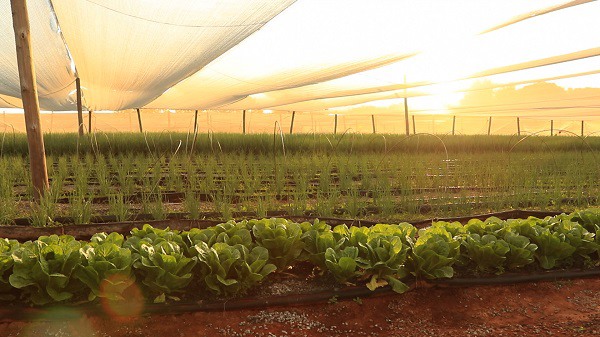 Hydroponic vegetable growing
Hydroponic vegetable growing
True sustainability does not exclude
Woolworths has only a few farmers who grow exclusively for them. Many of their farmers also supply competitor retailers with the same crops raised according to the Farming For the Future guidelines.
In fact, he notes, some growers on the programme supply Woolworths with as little as 5% of their entire crop, but in their view that alters nothing.
"In sustainability, the moment that you're exclusive, and disqualify some from participating, then it's no longer sustainability. Then it's greenwashing," Kobus firmly declares. "Farming For the Future is Woolworths' contribution to farming in South Africa."
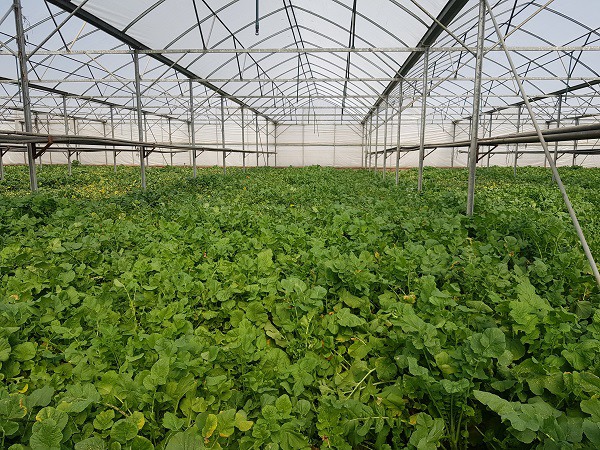 A brassica green crop ready to be worked into the soil to stimulate microbial activity
A brassica green crop ready to be worked into the soil to stimulate microbial activity
It's an expensive programme to run – twelve scientists and tests conducted both locally and at international universities. They are pulling in fresh dairy farmers and by 2030 they intend all of the farms that supply Woolworths to be on the programme, regardless what they produce.
Opens up possibility of carbon trading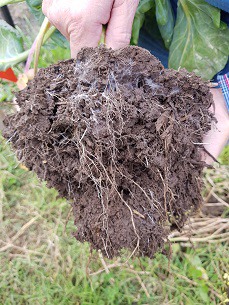 Through the recordkeeping of their carbon footprint, Farming For the Future farmers are in a position to negotiate carbon credits with international buyers that can include corporates and government departments in the Northern Hemisphere which need to offset their footprint for tax alleviation purposes.
Through the recordkeeping of their carbon footprint, Farming For the Future farmers are in a position to negotiate carbon credits with international buyers that can include corporates and government departments in the Northern Hemisphere which need to offset their footprint for tax alleviation purposes.
Right: root development with the aid of Trichoderma fungi and humic acid
Farmers can also track their reduction in nitrogen usage over time.
Kobus observes that the recent spike in fertilizer prices caused by Russia's war has flamed new enthusiasm among farmers for the principles of the programme.
"Those critical first steps take a few years. Sometimes farmers might have their doubts, they could have a fear of change, but fortunately we have now gathered a number of farmers who have been on the programme for a while. We don't have all the answers yet and we make mistakes, but we've come a very long way. I call it the University of Farming for the Future. I'm very proud of what we're doing here."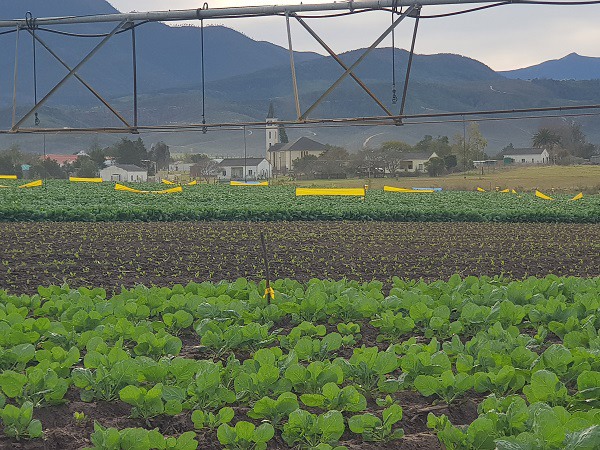 Mass trapping of insects: "Farming For the Future growers have to move away from programmed spraying of hard chemicals"
Mass trapping of insects: "Farming For the Future growers have to move away from programmed spraying of hard chemicals"
 For more information:
For more information:
Kobus Pienaar
Farming For The Future
Email: [email protected]
https://www.woolworths.co.za
